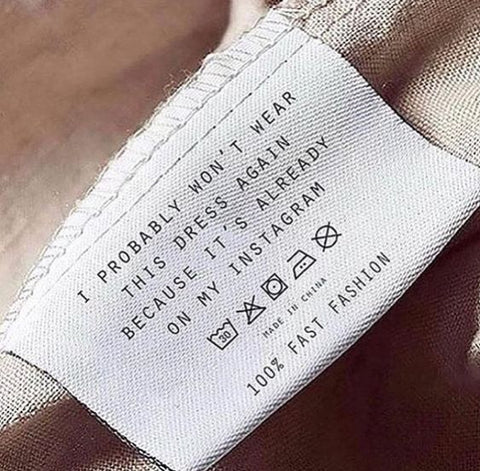What is Fast Fashion?
With TikTok and Instagram fashion bringing back 70s patterns and 90s grunge, it's easy to get wrapped up in looking trendy. And now major brands are rolling out sustainable lines and recycling schemes, telling a friend from foe has never been harder for consumers. So what is fast fashion, and why should you avoid it?
By definition, fast fashion is the term used to describe highly profitable and exploitive businesses. Brands that churn out replicas of trends and mass-produce these at a low cost. The problem is that these clothes are not made to last for a reason. This high turnover in trends aims to persuade you that you must buy a new outfit every time you go out and a new wardrobe every season. And if you don't feel like you need to chase trends, these clothes will be no good after a max of 10 washes. The phrase “this is so last year” has suddenly got a much more sinister meaning.
In summary, fast fashion is cheap and trendy clothing that you won’t wear more than twice.

The Cost of Fast Fashion
Producing these poorly made garments also uses vast amounts of water. To make one pair of jeans alone manufactures use 1,800 gallons of water.
In the UK, we also throw out more than 300,000 tonnes of clothing every single year. A lot of these clothes are made from polyester, aka plastic. As we now know polyester can only break down into microplastics that in turn end up in the ocean and, eventually our plates.
There are also a variety of social issues associated with fast fashion. According to the Fashion Checker (an app that assesses how sustainable a fashion brand is), 93% of current fashion brands aren't paying their garment workers a living wage. In many cases, it’s way below. When you purchase a t-shirt for just £5, by the time that profit is distributed across the head office, the workers in factories are paid virtually nothing. You can read our interview with Besma Whayeb to learn how to begin your journey to sustainable fashion.
Where does fast fashion end up?
So when we throw away an old fast fashion garment, where does it go? The answer really isn't pretty. Truth is, clothing waste can take hundreds of years to biodegrade, if it even does at all.
Around 59,000 tons of unsold or unwanted clothes from the U.S. or Europe end up at in Northern Chile at the Iquique port each year. Consequently, Chile’s Atacama Desert is absolutely covered in piles of textiles, creating dune like structures. These toxin and dye filled garments rarely break down and instead pollute the area indefinitely.
Other clothes sent to Chile sometimes get burned, sending toxins into the air and air and underground water channel. The health consequences of this are staggering.
The greenwashing in the fashion industry is rampant. Many fashion brands claim to have sustainable lines made of greener materials. But that does not mean these clothes are built to last. Check out our guide on greenwashing to see whether you've fallen into the greenwashing trap.
Second Hand Fashion: how to get started
-
Buy less
-
Buying clothes that are built to last
-
Buy from sustainable brands
-
Think before you throw
-
Second hand goodies, swaps, and rentals
1. Buy Less
Now, this might seem obvious, but every piece of clothing you purchase has an environmental impact, no matter how sustainable the company is. Using resources for production, transportation, and delivery. Try asking yourself, “do I really need this?” or “do I already have something similar?”. The 30 wear challenge is a good rule of thumb to go by when trying to reduce your fashion purchases. It forces you to ask yourself, "will I wear this 30 times?” If the answer isn’t an instant yes, then chances are you don't need the item.
As Lisa Williams, Patagonia’s Chief Product Officer, said, “The most environmentally sustainable jacket is the one that is already in your closet”.

2. Buying clothes that are built to last
We do understand that not everyone can afford sustainable fashion all of the time. Responsibility must be placed on corporations rather than the consumers and we always advise on doing what is reasonable in your household. But consider that buying pieces built to withstand the test of time will save you money in the long term.

Interested in sustainable beauty products as well? Check out our conversation with Beauty Kitchen, plastic free and refillable skin care.
3. Think before you throw
There is a whole heap of options to choose from before you decide your old jumper is destined for the bin. Here are our favourites:
-
Donate your clothes to charity, or give to friends and family.
-
Sell them on second hand platforms such as Vinted, Depop or eBay.
-
Put granny's sewing lessons to the test and try to repair them yourself.
-
A variety of brands will take back used items.
4. Second Hand goodies, swaps and rentals
Instead of buying new, consider buying second-hand. There is a vast array of options to choose from, such as charity shops, vintage markets, and online pre-loved platforms such as OLIO. OLIO is an app that promotes free donating and swaps in your neighbourhood. Have you ever thought of renting clothes? It's a great way to get outfits for occasions, such as bridesmaid dresses and NYE fits. Finally, there are plenty of online groups on Facebook that offer clothes swaps, a great way to spruce up your wardrobe, for free!
Ethical Fashion Brands
There are more and more brands taking environmental and social factors into account when producing their products. Here are some of our favourite for when your closet needs an update
-
Lucy & Yak - An independent and ethical brand, dedicated to having a positive environmental and social impact. They focus on funky colourful dungarees and boiler suits!
-
Pangaia - Pangaia uses bio-based fibres and materials from recycled plastic bottles to create their fun colourful loungewear and basics.
-
GNGR BEES - Plastic activewear anyone? While plastic-based fabrics are best avoided, in certain cases their use is necessary such as raincoats and activewear. They sells women’s activewear made from 100% reclaimed and up cycled waste materials especially reclaimed plastic bottles. Besides reusing and reclaiming plastic waste, they have put a lot of thought behind making sure every aspect of the business is ethical and eco-friendly.
-
Patagonia - This is a long time favourite. Their clothes are built to last and have a scheme where you can get your clothes fixed so that they last and even longer time. Patagonia is the original slow fashion trailblazer launching with the environment in mind all the way back in 1973.
-
Before July - A slow fashion brand offering colourful, stylish made-to-order pieces. The perfect place to find on-trend pieces without shopping fast fashion. Designer Elisa Jaycott only releases 2 collections per year to limit environmental impact, so you get your hands on one of her dresses, consider us very jealous!
-
Beyond Retro - A London-based vintage clothes retailer. They don't produce any new clothes, just find homes for pieces already in circulation. In one year they were responsible for rehoming 10% of the UK’s annual total textile waste! This is a far more affordable option for starting your ethical fashion journey than buying brand new, and you're technically stopping clothes ending up in landfill.
The cost of fast fashion goes beyond the price tags. It affects our environment and poorer communities that are disproportionately impacted by climate change. But we understand that fast fashion is something that's all around us and is sometimes hard to avoid. While not everyone can afford to always buy pieces that last, we can all make small changes that accumulate into massive impacts. So don’t beat yourself up if avoiding fast fashion is not something that you can do all the time. None of us are perfect. Always progress over perfection.
Happy shopping!
Written by Olivia Young





Leave a comment (all fields required)